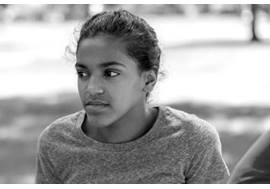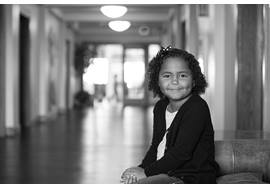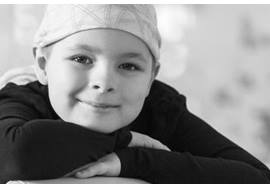Pediatric Psychology & Neuropsychology
Focusing on Your Child's Cognitive, Social and Emotional Functioning and Physical Health
Pediatric Psychology and Neuropsychology
Pediatric Psychology and Neuropsychology at Nationwide Children's Hospital concentrates services in two primary areas.
- Pediatric Psychology provides specialized assessment and intervention services that focus on the relationship between children’s cognitive, social, and emotional functioning and physical health, typically for children with co-occurring medical conditions (e.g., cancer, diabetes, sickle cell disease).
- Pediatric Neuropsychology performs specialized evaluations for children and adolescents with a range of medical and neurological disorders that impact thinking or behavior (e.g., brain tumors, epilepsy, seizure disorders, traumatic brain injury).
Faculty members engage in a diverse range of research activities. Several faculty members are Principal Investigators in the Center for Biobehavioral Health at The Research Institute at Nationwide Children’s Hospital, and have received funding from the National Institutes of Health for their research programs.
A variety of training programs exist, including a predoctoral practicum program, a predoctoral internship and postdoctoral fellowships.
Meet Our Team
Pediatric psychologists at Nationwide Children's are experts in providing specialized assessment and intervention services for children and adolescents with medical conditions and their families within various settings: in the outpatient care setting, inpatient medical units of the hospital, and as part of the interdisciplinary medical teams in specialty clinics. Pediatric psychologists focus on the relationship between children’s cognitive, social and emotional functioning and their physical well-being.
The Pediatric Neuropsychology Program at Nationwide Children’s Hospital provides neuropsychological evaluations for children, adolescents, and young adults with a diverse range of medical, neurological, and neurodevelopmental disorders that impact thinking or behavior. A neuropsychological evaluation can be conducted to help a child’s family, doctor, teacher, and therapists provide support and assistance to meet the child’s unique needs.Outpatient Psychology Services
Pediatric Psychology provides outpatient services in our Psychology Clinic for children, adolescents, and their families needing assistance with:
- Assessment and intervention for coping and adjustment to chronic or acute medical conditions including anxiety and depression related to medical conditions
- Promotion of positive health behaviors such as lifestyle changes, good sleep habits, and regular school attendance following chronic illness diagnosis
- Adherence to medical regimens, including medications, nutrition, exercise and other therapies
- Pain management interventions including biofeedback and relaxation training for pain conditions and anxiety disorders related to medical conditions
- Psychoeducational testing for children with suspected learning disabilities
Psychology Consultation & Liaison Services
Pediatric Psychology provides inpatient consultation services to the medical sections at the hospital. Pediatric psychologists assess psychosocial concerns and provide appropriate intervention while patients are in the hospital. Psychological interventions may address coping/adjustment, developmentally appropriate understanding of diagnosis/treatment, pain management, procedural distress, grief, traumatic stress, or other emotional/behavioral difficulties.
Additionally, pediatric psychologists may serve as liaisons between the medical provider and patient/family to better enhance communication and facilitate understanding. For some of our patient populations (e.g., newly diagnosed cancer, burn injury, sickle cell disease, and all youth admitted to our physical rehabilitation unit), a pediatric psychologist is automatically consulted during their admissions as part of comprehensive multidisciplinary care. Pediatric psychologists may also continue to follow patients on an outpatient basis through medical specialty clinics or in Psychology Clinic.
Additionally, pediatric psychologists also regularly participate in multidisciplinary team meetings, care conferences, and program development.
Pediatric Psychology serves the following teams:
Interdisciplinary Medical Clinics
Our pediatric psychologists and neuropsychologists act as integral team members with many medical teams at Nationwide Children's Hospital.
Neuropsychological Evaluations
Neuropsychological Evaluations include testing of:
- Intellectual functioning
- Academic skills
- Language skills
- Nonverbal and visual spatial skills
- Memory
- Attention
- Processing speed
- Executive functioning
- Sensorimotor functioning
- Behavioral and emotional adjustment
Pediatric Neuropsychology treats the following conditions:
- 22q11.2 Deletion Syndrome
- Brain tumor or other forms of cancer (e.g. leukemia)
- Brain infections (e.g. encephalitis, meningitis)
- Concussions
- Cerebral Palsy
- Difficulty in learning, attention, behavior, socialization or emotional control
- Genetic and metabolic disorders
- Hydrocephalus
- Prematurity and/or low birth weight
- Seizures or epilepsy
- Spina Bifida or Myelomeningocele
- Stroke
- Sickle cell disease
- Traumatic brain injury
- Other medical conditions or treatments impacting brain function
Integrated Primary Care Model
Children with medical problems can also have emotional, behavioral, or social problems. It is helpful to understand how these problems affect each other so they can be addressed.
A pediatric primary care psychologist can help you and your primary care provider (PCP) make a plan and set goals.
A pediatric primary care psychologist can:
- Be present during appointments with your child’s PCP, when needed
- Answer questions you have about parenting, health, behavior, feelings, learning, or school
- Help your child’s PCP better understand your concerns, so you can get answers to your questions
- Provide therapy for concerns, when needed. If you and the psychologist decide your child needs extra help, he or she will make helpful referrals.
Who We Help
Pediatric primary care psychologists are here for any child that may need help working through emotional or behavioral problems. These problems may or may not be related to a medical problem.
We can help with everyday problems, too, such as eating healthy, taking medicine, toilet training challenges and more.









